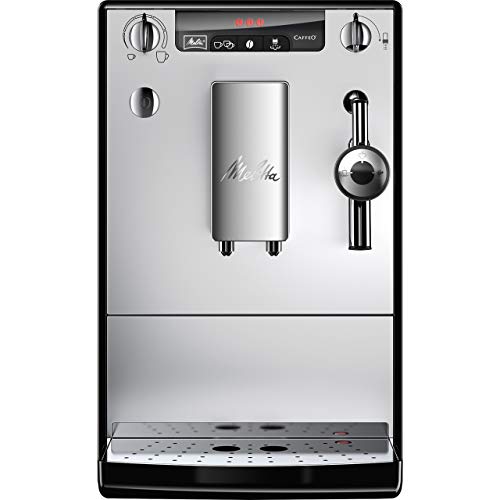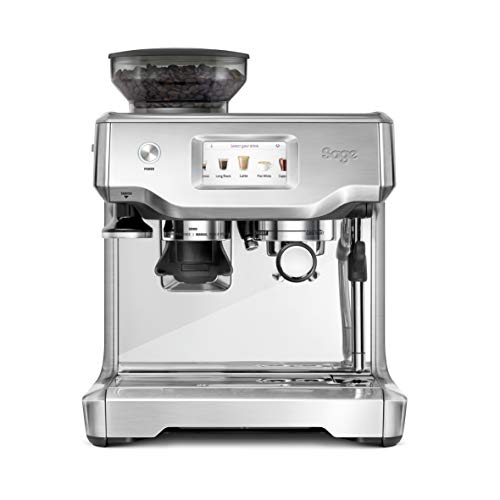This Is How Coffee Bean Coffee Machine Will Look In 10 Years' Time
페이지 정보
작성자 Marcelino Murni… 작성일25-01-03 18:44 조회57회 댓글0건관련링크
본문
 bean to cup brewer-to-Cup Coffee Machines
bean to cup brewer-to-Cup Coffee MachinesBean-to-cup machines are ideal for those bleary-eyed Monday mornings where you just want to press one button to get your morning caffeine fix. They also provide a level of flexibility for adventurous drinkers.
They do this by storing the entire beans in a hopper and grinding them before brewing. They then serve drinks with the touch of a key. They are able to serve customers and employees without the expertise of baristas who are trained.
Cost-effectiveness
If you prefer the traditional flavor of freshly ground beans or the convenience of pre-packaged coffee pods, each type has pros and cons. In the end, cost-effectiveness is a crucial factor. Bean-to-cup machines are more affordable in the long run than pod-based models. They can help you save recurring expenses by using bulk-bought high-quality, premium beans, which can be bought at a less expensive cost than pods. In addition, they can cut down on waste by eliminating the need to dispose of coffee pods.
Bean-to cup coffee makers are perfect for office settings, as they're simple to use. Bean-to-cup coffee machines are a excellent alternative to manual drip-style coffee makers that require users to grind and prepare beans manually. They make an even, smooth drink at the touch of the button. In addition they are designed with minimal maintenance and cleaning in mind. Additionally, many have integrated cleaning and rinsing programs that make it simple to keep them running smoothly.
The primary benefit of a Bean-to Cup machine is its simplicity of use. It is easy to use and set up, and does not require any prior knowledge. It comes with a built-in grinder and often comes with an automatic milk maker, making it ideal for businesses with limited staff. It also offers top-quality espresso at the click of a button. This is particularly useful for offices with a lot of traffic.
It might be more expensive to purchase a bean-to-cup machine than a pod-based one however, it will save you money in the long run by reducing the energy and supply costs. Additionally, it is eco more sustainable than pod-based machines since it produces less waste and consumes less natural resources.
Coffee is a great way to boost morale and increase productivity. By putting a coffee maker in the break room and creating an environment that encourages collaboration and teamwork. It can also promote social interaction between your employees by encouraging informal discussions. In these discussions, employees can share their ideas and come up with creative solutions to problems. A quick cup of coffee can provide a boost to your mental health and stimulate your creativity.
Convenience
Bean-to-cup coffee machines provide an affordable method of providing premium coffee at the touch of an button. They are easy-to-use and require minimal maintenance. They come with grinders built-in which ensure that your beans are freshly ground for each cup. They can also be programmed to produce various drinks with the push of a button, such as cold and hot beverages. You can make a wide variety of drinks to serve your patrons and staff.
A bean-to-cup coffee maker can also save you money by reducing the use of paper filters and plastic cups. It also reduces the amount coffee grounds end up in landfills. If you are an environmentally conscious person, you could make use of a coffee machine that provides whole beans that are organic to provide a more sustainable experience.
Bean-to-cup machines are easier to use than pod coffee machines. They require minimal or no education. The user just has to fill the bean hopper and the water tank before choosing the drink they want from the machine's easy-to-use control panel. Some coffee Beans machines (Google.Com.Uy) allow the user to alter the strength and temperature settings.
While pod coffee machines use pre-ground coffee that is powdered the bean-to-cup coffee machine grinds whole beans prior making each cup of coffee. This keeps the aroma and flavor of the beans and results in a more authentic flavor and texture. These machines can also tailor each cup of espresso to the person using it by observing their preferences over time. Barista Smart is a good example of a machine that does this. It can be programmed to handle 21 different kinds of coffee of coffee, ranging from espresso to black coffee.
A bean-to cup coffee machine will also run a rinse cycle before it turns off and when first turned on. This helps to prevent the accumulation of coffee residues on the coffee spouts and milk dispensers. Additionally, it will have an internal bin to collect leftover coffee grounds and milk. This bin doesn't need to be emptied daily and will usually have an indicator that indicates when it is full.
Freshness
Freshly brewed coffee is packed with health benefits. It can improve metabolism, decrease the risk of heart disease, and give you a natural energy boost. It is crucial to select the best beans for your machine. Choose whole bean coffees with a clearly marked roast date to ensure the best coffee beans for bean to cup machines quality and taste for your cup. This is especially important for bean to cup machines that require freshly-roasted, pre-ground beans. Stale coffee beans will have a bitter taste and poor flavor.
The shelf life of coffee beans is contingent on a variety of factors, including storage conditions and temperature. If properly stored, unopened bags of whole coffee beans can last up to six months from the time of roasting. After the beans are grinded, the shelf life of the beans decreases due to the increased exposure to oxygen. It is generally recommended to use freshly ground beans within two weeks after opening or grinding.
Another method to determine if your coffee is fresh is to look at the appearance of the beans. Fresh whole beans will have a shiny appearance while older coffee beans will look dull and dry. You can also gauge the freshness of the beans by tasting them.
When coffee beans are roast, they release volatile aromatic oils which imparts the taste of the bean. These oils are responsible the distinctive scent of every coffee. When they lose their potency the flavor of coffee will suffer. To avoid this, be sure you buy coffee beans with a clear roasting date and keep them in a sealed airtight container.
It is also recommended that you grind the coffee a few days prior to making. This will slow down the process of oxidation and ensure that you enjoy the fullest flavor possible. For optimal results, don't store roasted coffee beans in the freezer. This could cause structural damage and the accumulation of moisture.
The hopper is an essential component of any bean-to-cup machine and must be regularly cleaned to get rid of dirt and water. Cleaning the hopper can prevent blockages and improve the overall performance of the machine. It is possible to do this by taking the hopper off every day, washing it in hot water and wiping the hopper with a soft cloth to get rid of any dust or buildup.
Sustainability
Whether you consume your coffee from an instant cup, a filter or a capsule that is single-serving, the most sustainable choice is to buy beans that are grown and processed sustainably. The roasting and packing processes produce many waste products that can be reduced by selecting sustainable brands or purchasing beans that are fair trade certified or UTZ certified. These certifications guarantee that the farmers who cultivate the beans get a decent amount of money and good working conditions.
Coffee beans are the most significant contributor to greenhouse gas emission. The amount can vary from 40 to up to 80%. Large companies make use of intensive pesticides and irrigation to boost yield. This causes deforestation, contaminates water sources, and kills different species. It also causes soil erosion to increase which reduces the soil's condition and leads to climate change.
If you opt for a bean-to-cup machine, you can reduce your coffee's carbon footprint by removing the necessity for paper cups and plastic pods. You can even go further and share the machine with a friend to reduce energy consumption. Another method to lessen the environmental impact of your coffee beans machine is to buy a green refillable pod that is able to be used a number of times.
 The increasing emphasis on sustainability has made espresso machines more efficient, with a lot of them making use of less power than they did in the past. Some are made from recycled materials, and some are 100% compostable. They will be biomaterials within 84-days of disposal. You can avoid adding to the waste issue by encouraging colleagues to use mugs or reusable tumblers, and also by offering to compost coffee grounds. You can also help by donating to charities which promote responsible coffee production. Additionally, you can reduce your carbon footprint by avoiding single-use accessories like stirrers and sugar.
The increasing emphasis on sustainability has made espresso machines more efficient, with a lot of them making use of less power than they did in the past. Some are made from recycled materials, and some are 100% compostable. They will be biomaterials within 84-days of disposal. You can avoid adding to the waste issue by encouraging colleagues to use mugs or reusable tumblers, and also by offering to compost coffee grounds. You can also help by donating to charities which promote responsible coffee production. Additionally, you can reduce your carbon footprint by avoiding single-use accessories like stirrers and sugar.Warning: Use of undefined constant php - assumed 'php' (this will throw an Error in a future version of PHP) in /data/www/kacu.hbni.co.kr/dev/skin/board/basic/view.skin.php on line 152
댓글목록
등록된 댓글이 없습니다.

